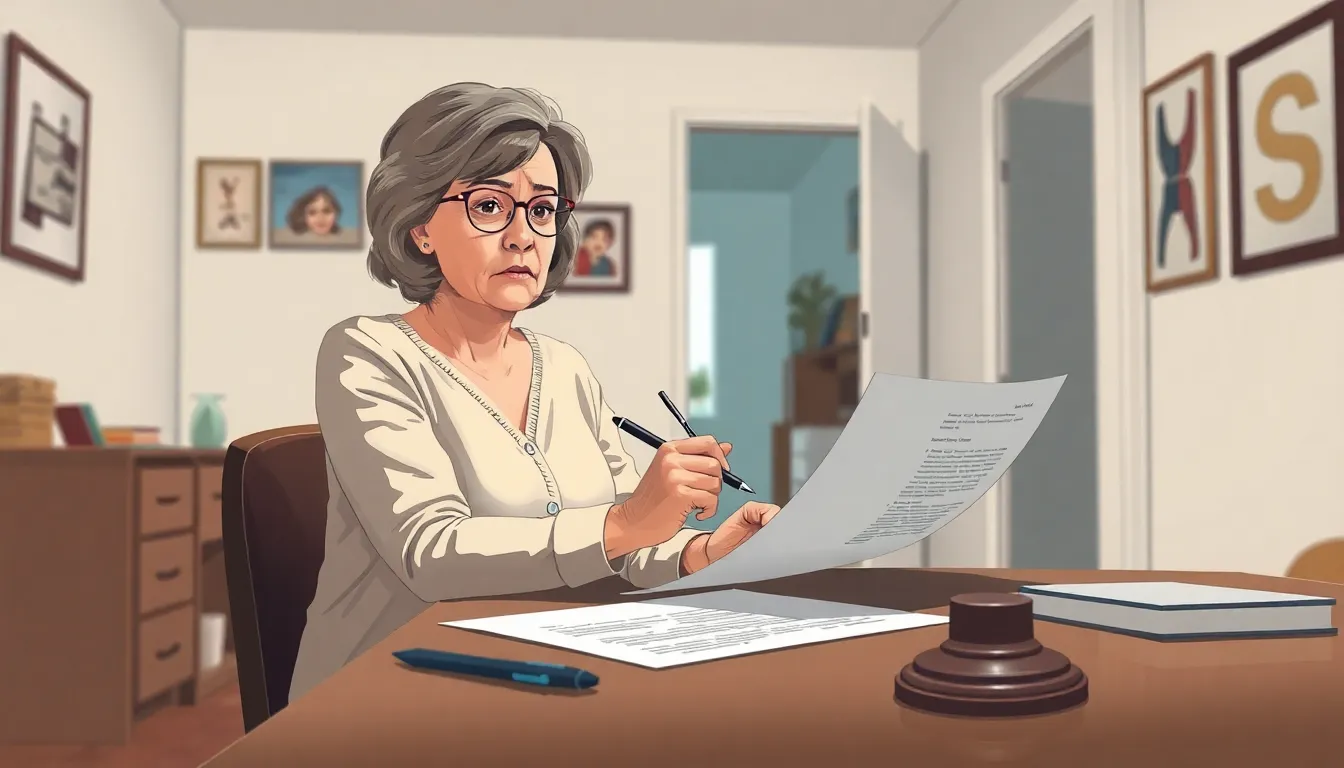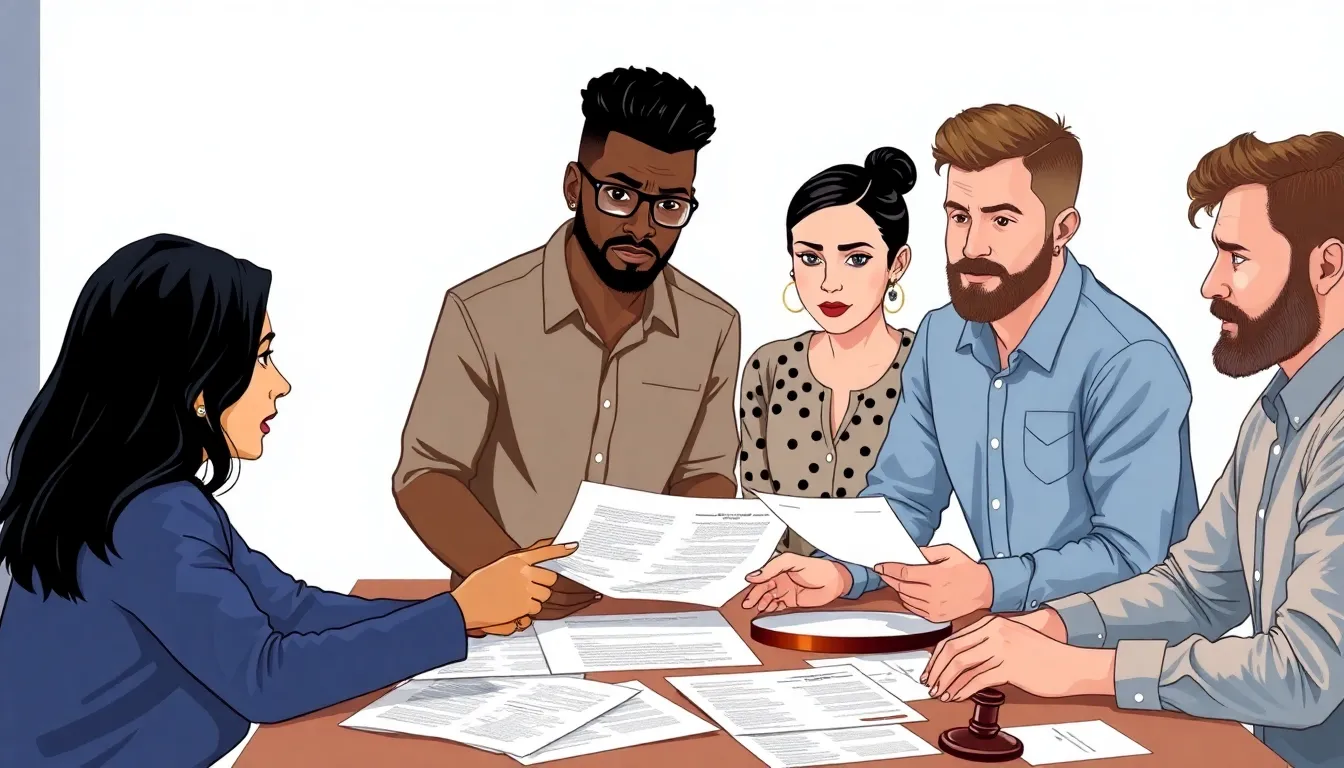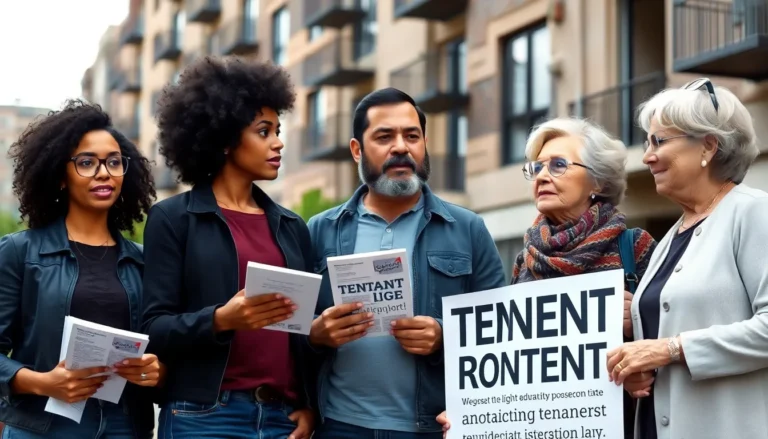Table of Contents
ToggleNavigating the rental world can feel like walking through a minefield, with landlords lurking at every turn. When issues arise, tenants often find themselves in a pickle, unsure of their rights and options. That’s where tenant legal help swoops in like a superhero—minus the cape, of course.
Understanding tenant rights can be as tricky as finding a parking spot in a crowded city. But fear not! With the right legal guidance, tenants can tackle disputes, lease agreements, and eviction notices with confidence. It’s time to turn those rental woes into a victory dance. After all, who wouldn’t want to live stress-free in their own home?
Understanding Tenant Legal Help
Tenant legal help refers to the assistance that renters receive from legal professionals regarding their rights and responsibilities. This support often includes guidance on lease agreements, eviction notices, and dispute resolutions with landlords.
Definition of Tenant Legal Help
Tenant legal help encompasses various services aimed at protecting renters’ rights. Services include legal advice, representation in court, and assistance with understanding rental agreements. Organizations and attorneys specialize in tenant law, ensuring renters receive information relevant to their situations. Legal aid societies may offer these services for free or at reduced rates to low-income individuals. Knowing the resources available enhances tenants’ ability to navigate the complexities of rental agreements and legal battles.
Importance of Tenant Legal Help
Tenant legal help plays a crucial role in maintaining fair rental practices. Understanding rights helps tenants address unfair treatment, negotiate lease terms, and respond effectively to eviction notices. Seeking legal support can significantly reduce the stress associated with disputes. Research shows that tenants who obtain legal assistance may experience better outcomes in housing stability. Empowering renters fosters a healthier rental market by promoting accountability among landlords. Access to legal help enables tenants to assert their rights confidently, leading to enhanced living conditions.
Common Legal Issues Faced by Tenants

Tenants frequently encounter various legal challenges that require assistance for resolution. Understanding these issues significantly impacts their rights and responsibilities.
Eviction Proceedings
Eviction proceedings represent a major concern for tenants. Failure to pay rent or violating lease terms may lead landlords to initiate eviction actions. Legal help can ensure tenants understand their rights throughout the process. Representing tenants in court, attorneys can counter wrongful evictions or negotiate terms, often preventing homelessness. Knowing local eviction laws also helps tenants defend against unjust claims, potentially leading to agreement with landlords outside court. Various legal aid organizations offer resources and representation during eviction disputes, providing substantial support.
Security Deposit Disputes
Security deposit disputes pose another common issue. Many tenants face challenges recovering their deposits after lease termination. Landlords often cite damages or cleaning costs to retain the security deposit, creating confusion for tenants. Legal assistance aids in understanding state laws regarding deposit return timelines and permissible deductions. Attorneys can help tenants negotiate with landlords when deposit claims seem unreasonable. Knowing the security deposit laws can prevent unfair withholding and ensure tenants receive the proper restitution, improving financial security after moving.
Lease Agreement Conflicts
Lease agreement conflicts can complicate tenant experiences. Disagreements often arise over lease terms, such as rent increases or maintenance responsibilities. Tenants sometimes sign agreements without fully comprehending the implications, leading to confusion later. Legal guidance helps clarify ambiguous terms and ensures tenants understand their rights and obligations. Lawyers can negotiate modifications if issues arise or represent tenants in disputes, strengthening their negotiating position. Awareness of legal rights provides tenants with the confidence to challenge unjust lease conditions effectively.
Sources of Tenant Legal Help
Various sources provide essential legal help for tenants. These resources empower renters to effectively address their legal challenges.
Nonprofit Organizations
Nonprofit organizations often focus on tenant rights and housing issues. They offer free or low-cost legal assistance to renters facing disputes. Many provide advocacy, education, and resources regarding local laws. Families at risk of eviction, for example, can find support through these organizations. Programs vary by region, but common services include counseling and legal clinics that equip tenants with necessary knowledge.
Legal Aid Societies
Legal aid societies play a critical role in providing legal support to low-income individuals. They specialize in issues like eviction and housing discrimination. Many societies serve specific geographic areas, ensuring renters receive localized assistance. Free legal advice and representation are common services offered. For instance, in some states, legal aid societies may have dedicated hotlines for urgent queries regarding tenant rights.
Private Attorneys
Private attorneys offer a different pathway for tenants seeking legal help. Attorneys working on a contingency basis can provide services without upfront costs. In rental disputes, their expertise can lead to improved outcomes for tenants. Hiring a private attorney often results in personalized legal strategies tailored to individual situations. Some attorneys specialize exclusively in landlord-tenant law, ensuring renters receive focused support in complex cases.
How to Access Tenant Legal Help
Accessing tenant legal help is crucial for navigating rental issues effectively. By utilizing available resources, tenants can understand their rights and seek necessary support.
Finding Resources Online
Numerous websites focus on tenant rights and legal assistance. Popular platforms provide downloadable guides, legal document templates, and answers to common housing inquiries. Local nonprofit organizations maintain online databases that list legal aid societies and resources within specific communities. Searching for terms like “tenant legal help” or “housing assistance” can lead to relevant organizations. Online directories often include reviews, allowing tenants to assess the credibility of various services. Social media groups also serve as valuable forums for tenants to share experiences and resources.
Preparing for a Consultation
Proper preparation ensures productive consultations with legal professionals. Tenants should gather relevant documents, such as lease agreements, eviction notices, and communication records with landlords. Creating a list of specific questions helps clarify issues during the meeting. Understanding personal goals regarding the dispute aids in focusing the discussion. Prioritizing concerns enables attorneys to provide tailored advice. Lastly, noting any timelines or important deadlines enhances the effectiveness of legal guidance.
Tenant legal help is essential for navigating the complexities of rental agreements and disputes. By seeking guidance from legal professionals, renters can better understand their rights and tackle issues like eviction and security deposit disputes. Utilizing available resources empowers tenants to negotiate effectively and maintain fair rental practices.
Accessing tenant legal assistance not only aids in resolving immediate conflicts but also contributes to long-term housing stability. With the right support, tenants can transform their challenges into positive outcomes, ensuring a more secure and stress-free living environment. Embracing these resources is a crucial step toward fostering a healthier rental market for all.








